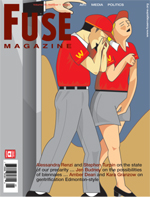
|
Lorna Mills and Sally McKay
Digital Media Tree this blog's archive OVVLvverk Lorna Mills: Artworks / Persona Volare / contact Sally McKay: GIFS / cv and contact |
View current page
...more recent posts
Over the past few weeks, L.M. and I have been posting some lovely mature juicey finished artworks by artists we admire. I decided to break it up with some raw scratchy half-baked drawings from my own sketchbook...

space/time cat water balloons

right/left brain owl

spread inspired by Miyazaki movies and a novel by Iain M. Banks
| Who do you like better, Shakespeare (thanks Bill) or Doctor Seuss? | |
|
O hell! what have we here? A carrion Death, within whose empty eye There is a written scroll! I'll read the writing. All that glitters is not gold; Often have you heard that told: Many a man his life hath sold But my outside to behold: Gilded tombs do worms enfold. Had you been as wise as bold, Young in limbs, in judgment old, Your answer had not been inscroll'd: Fare you well; your suit is cold. Cold, indeed; and labour lost: Then, farewell, heat, and welcome, frost! Portia, adieu. I have too grieved a heart To take a tedious leave: thus losers part. |
My hat is old. My teeth are gold. I have a bird I like to hold. My shoe is off. My foot is cold. My shoe is off. My foot is cold. I have a bird I liked to hold. My hat is old. My teeth are gold. And now my story is all told. |
The other day I made a post about tonight's launch of FUSE magazine, with the theme of precarity. I'm just finding out about this whole "precarity" thing myself. The term is useful because it allows for very different and disenfranchised groups of people to connect politically. The current issue of FUSE has an article by Alessandra Renzi and Stephen Turpin outlining the precarity movement.
Precarity describes the situation of temp or flex workers, ranging from workers in supermarkets and other big commercial chains to artists and employees of the service industry.Izida Zorde, editor of FUSE, says in her introduction:
[...]
By embracing a wide range of communication tools and practices, the precarity movement enables workers less familiar with their political conditions, yet all too familiar with the exploitation they engender, to contextualize their exploitation within the broader logic of capitalism, and connect to a wide range of struggles within a meaningful system of reference.
Citing the myth of the American Dream and its attendant fantasies of limitless opportunity and personal enrichment, [Renzi and Turpin] unpack how in foreclosing on the connections between economic oppression and organized political resistance, dominant North American culture reroutes political questions back onto the isolated individual.
Two articles I read recently seem possibly related under this precarity rubric. The first is a recent piece on the art market (thanks bill) by Jerry Saltz in Village Voice.
Painter Charline Von Heyl recently described Americans' disconnect between the personal and political this way: "While almost everything in the outer world feels messed-up, our inner lives aren't altogether messed-up." The current art world, awash in money and success, is shot through with a similar disconnect.The second article is a statement by Chris Gilbert, the curator from Berkley who resigned last year when he programmed a political show of art from Venezuela and the gallery wanted to change some of the accompanying text to mitigate expressions of "solidarity" and replace them with expressions of "concern."
[...]
The current market feeds the bullshit machine, provides cover for a lot of vacuous behavior, revs us up while wearing us down, breeds complacency, and is so invasive that it forces artists to regularly consider issues of celebrity, status, and money in their studios. Yet, it also allows more artists to make more money without having to work full-time soul-crushing jobs and provides most of us with what Mel Brooks called "our phony-baloney jobs." Last December, more than 400 New York art dealers representing more than 5,000 artists paid for booths in one art fair or another in Miami to participate in this market. Everyone is trying the best they can. For critics to demonize the entire art world, then, as somehow unethical and crass seems self-righteous, cynical, and hypocritical.
The class interests represented by the museum, which are above all the interests of the bourgeoisie that funds it, have two (related) things to fear from a project like mine: (1) of course, revolutionary Venezuela is a symbolic threat to the US government and the capitalist class that benefits from that government's policies, just as Cuba is a symbolic threat, just as Nicaragua was, and just as is any country that tries to set its house in order in a way that is different from the ideas of Washington and London -- which is primarily to say Washington and London's insistence that there is no alternative to capitalism. I must emphasize that the threat is only symbolic; in the eyes of the US government and the US bourgeoisie, it sets a "bad" and dangerous example of disobedience for other countries to follow, but of course the idea that such examples represent a military threat to the US (would that it were the case) is simply laughable; (2) the second threat, which is probably the more operational one in the museum context, is that much of the community is in favor of the "Now-Time" projects -- the response to the first exhibition is enormous and the interest in the second is also very high. That response and interest exposes the fact that the museum, the bourgeois values it promotes via the institution of contemporary art (contemporary art of the past 30 years is really in most respects simply the cultural arm of upper-class power) are not really those of any class but its own.Mute was following the Gilbert thing closely, and reposted an Artforum piece by Liam Gillick.
As the controversy unfolds, it highlights the void between rhetoric and practice within a developed and striated art discourse. During a period of social and political strife, within the context of a superheated art market, there is an increasing gulf between those artists and curators who have carved out a path of resistance via ongoing critique of social systems and those who function in a more complicit relationship to the contradictory impulses that affect art production and mediation. For some it is increasingly difficult to follow Deleuzian aims toward complex understandings, the subtle likes of which may be said to have oriented artistic and critical discourse for decades. To quote the philosopher in his Two Regimes of Madness (1977), "We've been trying to create concepts with fine articulations, extremely differentiated concepts, to escape gross dualisms." For Gilbert, it seems that such critical self-consciousness in relation to art production can no longer be productive within a society that, as he sees it, is inured to the delicate probings of the super-self-conscious artist, curator, or critic. It is a time of gross dualisms once more, and it is necessary to take a stand and make a careful choice about who will be there alongside you.
There is a nice article here by Steven Pinker summing up the current theories in the science of consciousness. (thanks Timmer!) Quote:
Another startling conclusion from the science of consciousness is that the intuitive feeling we have that there's an executive "I" that sits in a control room of our brain, scanning the screens of the senses and pushing the buttons of the muscles, is an illusion. Consciousness turns out to consist of a maelstrom of events distributed across the brain. These events compete for attention, and as one process outshouts the others, the brain rationalizes the outcome after the fact and concocts the impression that a single self was in charge all along.Mark mentioned in some perception thread ages ago about the eye being an outgrowth of the brain. I went looking for some more info and found this cool sight, which describes "lateral inhibition" really well, complete with opticall illusion illustrations. Quote:
The organization of the brain is such as to create "abstractions", rather than to simply take input at face value. A checkerboard is a checkerboard is a checkerboard not because the input reaching our eyes is the same at all times but rather because the nervous system is organized to reject some information and replace it with other information. The "booming, buzzing confusion" of the external world is rendered stable and comprehensible by the organization of the nervous system. That organization represents information added by the nervous system to the information is receives, and constitutes a presumption that there exist stable, constant external forms with well-defined boundaries. The presumption is strong enough so the nervous system actually creates boundaries where none in fact exist...
I'm on the Editorial Committee at FUSE magazine with a great bunch of people. It's very very interesting, I'm learning lots. I hope y'all can come out to the launch on Thursday of our current issue. Details below...
an invitation from FUSE magazine, precarity-canada
and the Toronto School of Creativty and Inquiry
--- --- --- --- --- --- --- --- --- --- --- ---
Thursday, February 1, 2007
Smiling Buddha Bar
(962 College St., Toronto)
7:30pm sharp
Pay What You Can or
$10 dollars includes a copy of the issue
--- --- --- --- --- --- --- --- --- --- --- ---
For the launch of the current issue of FUSE magazine, we have invited community organizations, political groups, and individuals to make statements on how "PRECARITY" affects their work and lives and how they are fighting back. We see the concept of precarity as a useful way of linking existing struggles and strengthening networks of solidarity and we want to hear how this network could help in your struggles.
We invite you to join us and make your own statement on precarity by participating in the on-site production of a video archive, or to just come out to support community organizations, FUSE magazine and precarity-canada by enjoying a night of djs, dancing, and drinking.
--- --- --- --- --- --- --- --- --- --- --- ---
We are precarious when we are homeless, unemployed, and underemployed; when we are struggling to pay rent, to find work, to access resources; when we are exploited, living under occupation, without status, and without benefits; when we are policed, surveilled and imprisoned; when we are isolated, alienated, and under-romanced. For these and many other reasons, we are precarious.
more information on precarity....
http://www.euromayday.org
http://republicart.net/disc/precariat/
http://www.precarity-map.net/
http://metabolik.hacklabs.org/alephandria/txt/Foti_Precarity.pdf
http://fusemagazine.org/current.html
[for more information on the event, contact precarity {at} gmail.com]


Monophonic 2007 wood, fluorescent lights, speaker box
New work by Nestor Krüger on now until March 10, 2007 at Goodwater Gallery
234 Queen Street East (Queen & Sherbourne)
